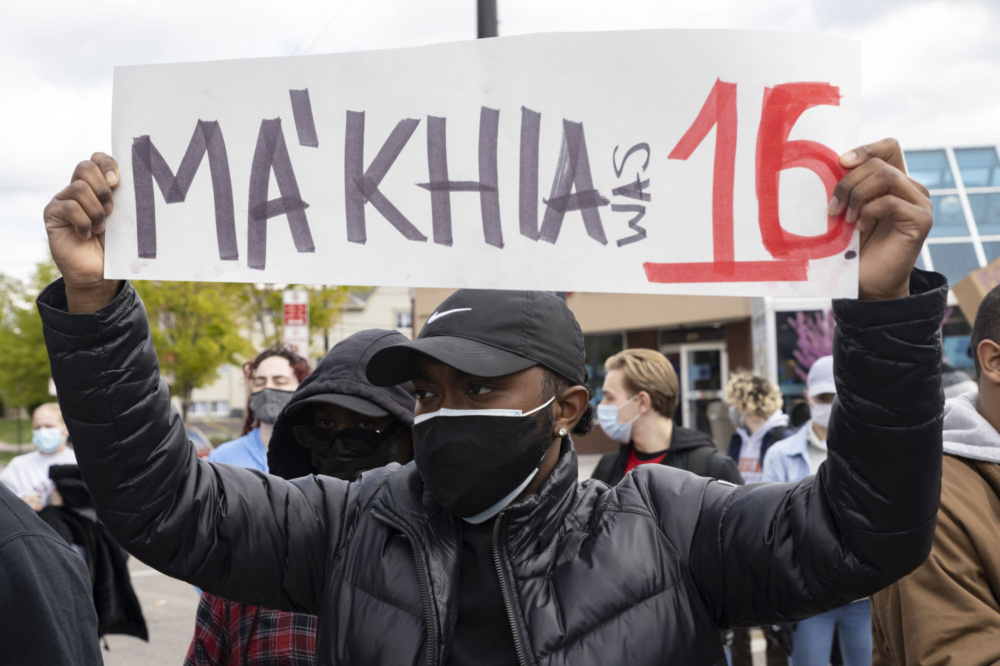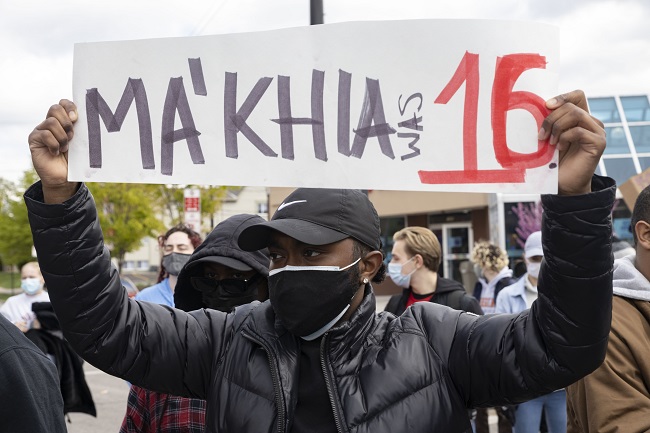Shooting of Ma’Khia Bryant Should Remind Us All That Black Girls Die at the Hands of Police Too
June 3, 2021

June 3, 2021
For me, it was the shoes. Thinking about my 18-year-old Black daughter, off at college, who wears those silly oversized plastic Crocs most every day, taking a moment to rejoice that she might know in the wake of the Derek Chauvin verdict that accountability for Black death can happen. And then literally moments later, witnessing the footage of a white police officer killing a 16-year-old Black girl, Ma’Khia Bryant, in Columbus, Ohio – the officer’s body camera footage eventually revealing her motionless feet wearing the exact same Crocs as my daughter. The immediate text with three broken heart emojis from my daughter brought me right back to reality.

Photo by Stephen Zenner/SOPA Images/LightRocket via Getty Images
For Black people and for the nation to which we belong, this rollercoaster of fear and trauma is unending. And there are more downs than ups. For every rare moment in which a murderous police officer like Derek Chauvin is held accountable, there are infinitely more Ma’Khia Bryants.
Derek Chauvin’s conviction for two counts of murder and one count of manslaughter for killing Geoge Floyd is an anomoly. Chauvin’s case isn’t rare because he’s a white police officer who abused his power and used deadly force against a Black person; unfortunately that’s all too common. Chauvin’s example is rare because he was held accountable and actually tried and convicted. According to the Mapping Police Violence project, between 2013 and 2019, of the 7,666 instances in which police officers in the United States killed people, just under 100 officers were charged and of those, only 25 were convicted. In other words, over 98 percent of police who kill in this country are never even charged with a crime let alone convicted.
And yet, according to a study in the journal Pediatrics, Black children are six times more likely to be killed by police than their white counterparts. Black girls are often targets for police violence, especially in school, an environment where they should be loved and nurtured. For all her extraordinary uniqueness, her beautiful singular potential-filled life that once lay before her, Ma’Khia Bryant is sadly not an anomaly. Her name will join the far too long list of those we call out in protests and cling to on posters, the writing paradoxically getting smaller and smaller to fully account for the growing magnitude of the crisis.
We might explain away one cop or one killing, but the statistics should force our reckoning with what is clearly systemic injustice. Despite the fact that 83 percent of Americans estimate that the average police officer fires their weapon at least once in their career, the fact is most officers never fire a shot. And yet, according to Rutgers University researchers, over the course of their lives, one out of every 1,000 Black boys or men will be killed by police. How are both these realities possible? Juxtaposed, this starts to look less like policing and more like a pattern of target practice. Not incidentally, the officers most likely to fire their weapons have certain traits in common – mostly men, mostly white, mostly military veterans. Indeed, we should look at all of this through the lens of recently leaked documents that revealed a number of active duty police across the country donated to the defense fund for Kyle Rittenhouse, an armed white vigilante accused of killing two Black Lives Matter protesters in Wisconsin last year. That police are disproportionately killing often-unarmed Black children at the same time they’re trying to insulate and encourage murderous white vigilantes tells us everything we need to know about problems in policing being not just about a few bad apples but a system that is rotten to the core. Oppressing Black bodies while encouraging white vigilantes was also the strategy of slave patrols from which modern policing descended.
We need to make police accountability common and Black death at the hands of police extinct. The culture of policing and the legal and union protections officers have, subvert any modicum of justice and safety for us all. Ma’Khia Bryant deserved better. She deserved an intervention that didn’t take her life, this should be our expectation. It seems almost too simple to say but nonetheless needs saying. Our children are not free. Our communities are not free. Our nation, in spite of all its lofty rhetoric and moments of promising steps forward, is still fundamentally a place where Black people are unsafe because the institutions that supposedly exist to protect all of us in fact harass, oppress, threaten and routinely kill Black people. We will not be a truly free and just nation until that changes. And Black people will never be free until we can stop fearing, every single day, that those lifeless feet might someday belong to any of our children.
